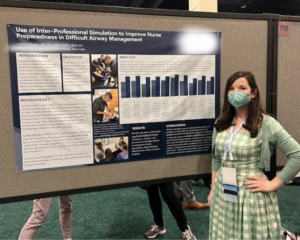- About Ramapo
- Academics
- Admissions & Aid
- Student Life
- Athletics
- Alumni
- Arts & Community
- Quick Links
- Apply
- Visit
- Give
Investigative Genetic Genealogy Center (IGG)
March 21, 2024A Day in the Life of a Full-Time IGG Practitioner
By Cairenn Binder

Cairenn standing in front of a poster in March 2022 during her previous career as a nurse educator.
Two years ago, I was working as a nurse educator in a community hospital, dreaming of the day I might be able to work full time in Investigative Genetic Genealogy (IGG). At the time, I practiced IGG on the side – both as a small business owner and with a nonprofit organization. As IGG is a still-growing field, I did not see an opportunity at the time to transition to full-time work in IGG.
A few months later, my life changed when I met Professor David Gurney, now my director at the Ramapo College IGG Center. We worked together to design sustainable programs which were bravely implemented by Ramapo College, and today we are two of the five staff members in the IGG Center.
Back then, I would have imagined that full time IGG work looked like this: sipping my coffee while spending the day solving cases and leading IGG teams to success. While I do indeed get to work on cases at the IGG center, a day in my life is a far cry from my imaginings two years ago. As Assistant Director of the IGG Center and Director of the IGG Certificate program, I have a lot more on my plate than casework. I believe it is similar for other leaders in the field of IGG who are employed full-time in the field. We are juggling casework, case management, fundraising, research, media, marketing and the endless minutiae associated with program management.
To give readers a taste of what a day in the life of an IGG practitioner looks like, I’ve sampled a few days from the past week to share.
Monday
7:00 AM – My day begins. Because my job encompasses both online and in-person duties including teaching classes online in the evening, I work from home some days. Today is a work from home day, so I begin early. My first task of the day is to read and respond to emails including questions from students, case management-related emails, exchanges about upcoming travel or conferences, and updates to forthcoming publications or media appearances.
9:30 AM – Curriculum updates. With the constant changes in IGG, our curriculum for the IGG certificate program requires updates every term. It is currently week 4 of the program, so I update the slides for both class days this week. Prof. Gurney is leading the classes today, so I spend some time discussing with him what each of us will teach this week. I also collaborate with our Case Manager to get students added to some resources they will need for upcoming coursework.
11:30 AM – Lunch, and I spend some time cleaning up all of the messes I made from traveling the past two weekends.
12:15 PM – Case management. We are looking at using a different genotyping method for some of our cases, so I send emails to various laboratories to obtain quotes for this service. I also exchange emails with a client who is working to confirm a suspect lead in a criminal case. Although our Case Manager performs most of the case-related tasks, there are some tasks that I am responsible for – especially when they elicit changes to our budget, case timeline, and curriculum.
2:00 PM – Casework. We have a difficult case with a dedicated team, and it’s a bit “stuck” due to recent immigration. I work on the chromosome map and find some triangulated segments that should be explored by the team.
3:00 PM – More emails! Sometimes, I describe my job as answering emails all day. That’s not really true, but I do spend a lot of time on e-mail. On this day, I am a bit backed up because I was traveling over the weekend, and replies from the emails I sent this morning now have landed in my inbox and need to be replied to. I try to keep my inbox cleared to under 50 emails (one “page” in Gmail). After this, my day is (mostly) finished – but I keep an eye out for important emails all the time!
6:00 PM – I learn one of our cases has been resolved and send an e-mail to the students who worked on the case to share the good news. I also provide a heads up to our Director of Communications & PR at Ramapo as this will likely be a big story.

Tuesday
8:20 AM – Today I am on campus and my day usually begins at 8 or 8:30. Of course, my first priority is to answer emails that came in overnight. I also email some of our speakers for the upcoming RIGG conference to obtain information that I need for social media and marketing of the conference. I also send a timeline of the recently-solved case to our Communications and PR Director.
10:00 AM – Social media updates. I like to get a few days ahead of our social media accounts by scheduling posts. I create some graphics for social media and get them scheduled for the coming week.
11:30 AM – Lunch at my desk – it’s a busy week!
12:30 PM – I virtually visit a high school forensics class to provide a presentation about IGG. They are a fun class and ask lots of great questions! Our team speaks at high schools, agencies and community organizations regularly in hopes of spreading the word about IGG and recruiting for our programs.
1:30 PM – Travel documents. We have some upcoming conferences which require approval. I spend some time filling out the required paperwork, booking airline tickets, and studying the event details, as well as creating marketing materials we will need.
3:15 PM – My work is done for the day (although I will still check my email through the evening). Some days I work 12 hours, some days I work 6 hours. As my Dean has described, my schedule is “elastic” because of the unique needs of our department.
Wednesday
8:00 AM – I’m on campus again today, and as usual my day begins with unpacking my inbox.
9:00 AM – Conference things. I have to update the schedule for RIGG, create social media posts about newly added speakers, exchange emails with vendors, and file paperwork. Conference planning is no small task – it is probably one quarter of my work!
11:00 AM – I attend a committee meeting for the College. Although most of my work is in the IGG Center, I frequently get to collaborate with other departments at Ramapo and engage with goings-on on campus.
12:00 PM – Today I forgot my lunch, and campus is closed for Spring break so options are limited! I manage to obtain some avocado toast from the cafeteria.
1:00 PM – I receive a phone call from an agency, and exchange emails with some laboratories to facilitate the needs of the agency.
2:00 PM – Meeting with a vendor to discuss a grant application.
3:00 PM – Grant writing. One of the most painful parts of the job (is there anyone who enjoys grant writing?) but this is a highly necessary skill and we are always seeking new funding opportunities at the IGG center!

Thursday
This is a bit of a cheat, since it’s Thursday at 9:17 AM right now! However, this is what I expect my day will look like.
6:30 AM – I update the IGG Center cases page with some new cases we have recently taken on.
7:30 AM – Inbox unpacking and scheduling social media posts.
8:30 AM – I notice it has been awhile since we have posted a blog, so I decide to write this one! Bonus, when I update the blog I will be able to update our social media as well!
11:00 PM – I am providing a talk about IGG at a museum in New Jersey. I hope that this will be a good opportunity to share the work we are doing that directly impacts agencies in New Jersey.
1:00 PM – I will teach our daytime IGG Certificate Program Class.
2:30 PM – I will finish unpacking my inbox, make sure our social media is all set, and set my out of office email for next week – I’m going on vacation!
7:00 PM – I will teach our evening IGG Certificate Program Class.
As you can see, there is very little time that I have the opportunity to focus specifically on casework. Thankfully, our cases are frequently cleared by the work of students in our programs, and volunteers both on campus and online. Still, when I want to I do get to build trees, perform segment analysis and create reports – I just have to find the time!
I hope this provides some insight into what a day in the life of an IGG practitioner looks like. To learn more about careers in IGG, be sure to check out our panel discussion at RIGG:

Categories: careers, practitioner tips, RIGG
January 22, 2024The emotional impact of working in Investigative Genetic Genealogy
By Cairenn Binder — January 19, 2024
My friend Jarrett Ross recently posted a video on his YouTube channel Geneavlogger titled, “Why I Quit Investigative Genetic Genealogy”, which describes his journey working as an investigative genetic genealogist and lists his reasons for leaving the field. I was surprised to learn that anyone would voluntarily leave a position in IGG because paid work for practitioners is so sought after. When I viewed the video, however, I could see why someone would make the decision to move on – and recognized some commonalities that I believe are experienced by many IGG practitioners. Jarrett describes the seepage of his IGG career into his personal life – causing fatigue, exhaustion and preventing him from pursuing other passions.
Jarrett also describes how exciting it was to narrow down leads and help to solve cases of violent crime and unidentified human remains. The thrill of the chase is what draws so many to the field, and the satisfaction of helping bring justice to victims of violent crime is the icing on the cake. With that said, there are some enormous drawbacks to working in IGG, and it is worth examining them before making a decision to jump into this career.
The stories are harrowing
IGG practitioners are tasked with generating investigative leads in some of the most grisly violent crimes imaginable. While our “need to know” is the bare minimum, we are often subject to learning the details of the crimes we are researching, and they can be haunting. It is common for IGG practitioners to express affinity with victims and their families, and traumatic stress, and fear for their personal safety and security – all related to working violent crime cases.
Working in nursing prior to my career in IGG, I am accustomed to hearing and seeing unpleasant things. I have experienced a patient die in one room, and two minutes later put on a smile for a person giving birth to new life in the next room. As a healthcare professional, I learned to steel myself from becoming too invested in the lives of my patients, instead remaining task-oriented and compartmentalizing my feelings.
In IGG, I do the same. Typically, I do not read about any details that I don’t need to know for my casework. I celebrate the success of generating a lead with my team(s), and take a moment to internally acknowledge the victim or decedent when the lead is confirmed. I try not to get too invested.
Even so, occasionally the details of a case will hit close to home, which can be extremely distressing. The case of Wendy Stephens was particularly difficult for me – killed at just 14 years old, she’d barely had the chance to find her way in the world before her life was taken. My own daughter was 14 when this case was solved, and it was impossible to keep my emotions at bay in spite of my efforts.
You will feel insecure
IGG is a rapidly evolving field. Keeping up with active cases playing out in court, ever-changing database and resource terms of services, and tracking newly introduced legislation could be a full-time job. My Director David Gurney often states that we are playing “Whack-a-Mole” contending with legislation meant to regulate IGG while simultaneously misunderstanding how IGG works.
When I worked in healthcare, job security in my industry was never a worry. With a near-constant shortage of nurses, I was not concerned that new legislation banning my industry altogether could impact my livelihood.
In IGG, it is true that on any given day, new legislation or a database change could erase the industry entirely. This may be a contributing factor to the discord that seems ever-present in IGG, along with the scarcity of IGG-related jobs to begin with. Living in this reality means contending with some degree of fear and uncertainty – all the time.
The work will bleed into your personal life
Once again, I have to look back on my career in healthcare as it contrasts so greatly with my current role. Rarely, if ever, did I feel compelled to check my work email account on a day off when I worked as a nurse. Never did I start working until I had actually arrived at work.
Today, however, I opened my eyes at 5:30am and immediately logged on to find out if new matches had populated in a case the IGG Center is working on. It is a common occurrence for me to check my work email and even perform work tasks in the evening or while on vacation. The ability to disconnect and maintain a healthy work-life balance feels significantly more challenging in IGG than it did in my previous career.
IGG practitioners are widely discussed and criticized
The practice of IGG has been debated in the media, in blogs, and in social media since its inception. Crusaders with privacy concerns arguing passionately for tighter legislation face off against investigators and IGG practitioners advocating for the continued practice of IGG. For people working in the field, it is impossible to escape the deluge of vitriol aimed at IGG practitioners.
I experienced this myself in the summer of 2023 when an article was published naming me as an IGG practitioner who had viewed opted out DNA matches in IGG cases. This was the result of a security flaw in programming of some tools which caused opted out matches to appear in outputs, and many (if not most) practitioners were aware of this “loophole”.
IGG practitioners who were named in the article were, for months, on the receiving end of hateful remarks that went above and beyond criticisms of our practice. I was shocked and saddened to be thrown under the proverbial bus by friends, colleagues and strangers alike who seemed glad of a scapegoat during that time period. It was impossible to escape the comments sections of various social media posts where people openly cheered my and my colleagues’ degradation – well-meaning people sent them to my messages asking, “have you seen what ___ said about you today?”
For months my mental health was impacted by the fallout, but living in the microcosm that is the online “IGG debate” community is not advisable. Thankfully, I was able to get myself outside, reconnect with my friends and hobbies, and realize that the world is full of many people – and most of them do not write bad things about me online.
Discussion and debate are vital to progress, which is why we welcome criticisms of IGG at RCNJ’s annual IGG conference, RIGG. IGG practitioners should be aware, however, that some critics are wont to spout hyperbole and personal attacks in their campaigns against IGG practitioners.
How to cope
While the field is incredibly difficult to work in, IGG certainly has its rewards. It is a career that can be worked, in many cases, entirely remotely – offering desirable flexibility and comfort. It is one of the few careers in which civilian true-crime enthusiasts can impact the path to justice for victims. It is a fun job where friendship, teamwork and collaboration are critical to success. Finally, it is a career in which a single person can make a lasting impact for good in the world. I count myself lucky to be here, in spite of the challenges.
While I don’t always take my own advice (working on it!), I am happy to dole it out. Here are my tips for maintaining balance and a positive mindset while working in IGG:
- Utilize mental health resources. We are fortunate to live in a time where mental health is becoming more of a priority, and utilizing mental health care has become less stigmatized. There are many resources available to members of the general public at no cost, including crisis hotlines and online wellness guides. This guide from the NIH has a listing of some available resources.
- Draw healthy boundaries. A former student in the Ramapo IGG certificate program once shared her experience as an emergency services operator, during which she would receive calls from people in distress during the most critical periods of their lives. She described the process of separating her work and home life, essentially “hanging up” her job at the end of the day and not taking her work home with her. The same can be applied to IGG – it is difficult to compartmentalize and separate ourselves from our casework, but it is necessary to avoid burnout and traumatic stress. Setting working hours and avoiding thoughts of cases and casework while not working is one way to draw a healthy boundary and protect your mental health.
- Avoid online discussions. I have learned the hard way not to argue with people online. It never resolves the situation, and in fact only increases post engagement for the people starting the arguments. When it comes to spirited debate that devolves into personal attacks, remember that hurt people hurt people and the attack is probably not really about you. Debate is necessary, but fighting on social media will not result in any big wins for IGG and only serves to make everyone look bad.
- Touch Grass. When you are nose-deep in casework, engrossed in social media, and working all hours of the day to promote your IGG career, it is easy to lose sight of the wider world. When you’re feeling overwhelmed, overworked, or overly zealous, it’s time to disconnect. Go for a walk without your phone (I personally enjoy a nice graveyard walk) and remember that there is a world outside of IGG.
Categories: practitioner tips
Copyright ©2025 Ramapo College Of New Jersey. Statements And Policies. Contact Webmaster.

Follow Ramapo